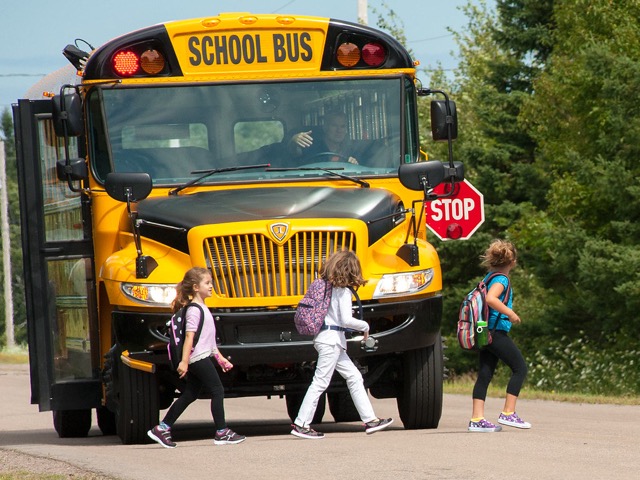Amherst Students To Return To School Buildings In April

Photo: flckr.com
High School Return May Not Be Possible, Due to COVID-19 Concerns & Prospect of Mid-Semester Class Disruptions
The Amherst, Pelham, and Amherst-Pelham Regional School Committees (RSC) voted last night (3/3) for all students to return to school buildings in April, after setting aside parts of an agreement with the teachers’ union on regional COVID-19 case numbers, The committees voted unanimously for the return, which technically refers to “all students,” although Superintendent Michael Morris said that bringing back high school students this spring would yield major disruptions to classes and schedules, and might produce an unsatisfactory result.
The motion passed last night directs Morris to “develop and implement a plan for in-person learning for all students who want it,” with grades k-2 returning by April 5, grades 3-6 returning by April 12, and grades 7-12 “returning by April 26 as (is) practical and feasible.”
Morris will manage the return, and any shift back to remote learning will be based on a continuous assessment of health conditions, in consultation with local public health officials.
“This is the end of automatic metrics in the Amherst Regional Public Schools … we are putting the authority squarely in the hands of the superintendent,” said School Committee member Peter Demling.
Last night’s vote to proceed with in-person learning followed an announcement on Tuesday by RSC Chair Allison McDonald that parts of the existing agreement with the Amherst Pelham Education Association (APEA) are invalid. Language which closed the Amherst Regional Public Schools (ARPS) based on regional COVID-19 case numbers are not enforceable, McDonald said, based on a February 9 Department of Labor Relations (DLR) decision in a Melrose case.
The DLR found that it is a school committee’s right to determine the learning model in place, and that such decisions can’t be delegated to employees or made subject to collective bargaining.
The Amherst agreement triggered closures when the weighted regional COVID-19 caseload surpassed 28 cases per 100,000 people over seven days. The caseload has remained far above that threshold since October. The district has removed a caseload update page from its website. However, the APEA’s link to the calculations posted on Facebook showed that there were 164.7 cases per 100,000 people as of March 2.
The APEA, which had refused the RSC’s requests to renegotiate the closing standard, had asked the RSC to delay last night’s vote. The union sought a meeting to discuss spring in-person learning opportunities, stating that a school committee vote at this time was not conducive to collaboration.
When contacted for comment last night, the APEA said that it has an educators’ group already working to develop ideas for effective in-person learning, “We urge our administration to 1) include educator voices in the steps moving forward and 2) provide clear expectations and protocols around safety, for both students and staff,” wrote Claire Cocco on the APEA board’s behalf.
McDonald said she told the APEA recently that the RSC could not delay the vote, and that she, Morris, and Assistant Superintendent Doreen Cunningham had a productive meeting with three members of the APEA board yesterday.
“They shared some ideas for assuring a safe return,” McDonald said, adding that more outdoor learning opportunities were discussed. Morris said the decision about whether to send a child back to school buildings will be a “gut-wrenching choice,” for some families.
Although small numbers of children have returned to Crocker Farm this week and others are expected to return to Wildwood later this month, Morris said the larger return is complex and the next several weeks are needed, to determine the numbers of children returning and remaining remote, to hire additional staff and create new bus routes. Special education services, which 20 percent of students receive, will have to be provided both in-person and remotely, as will classes for English Language Learners, who make up 10 percent of the district population. Some staff members will not be returning due to medical conditions.
Morris predicted that ¼ to ½ of all elementary students will have to change classes as a result of reshuffling to bring about the return to in-person learning.
Regarding the high school, Morris said individual student schedules would have to change significantly, which could be disruptive and stressful, especially for upper grade students who are carefully watching their grade-point averages. Some courses are taught only by one teacher per semester, and a student might lose access to such a course if their schedule shifted. Figuring out how to resume high school both in person and remotely is “a huge puzzle to solve,” he said.
On Tuesday night, Morris said Amherst Health Director Emma Dragon raised concerns about COVID-19 transmission by high school students due to their social behavior. In public comments last night, parents expressed dissatisfaction with the prospect of ARHS students not returning to buildings this spring.
“Don’t shut the door on having high schoolers come back this year …at this stage of the pandemic, many students who have been socially isolated are deep in a hole and don’t see a way out. Please, I beg you, give them a way out,” wrote Karen Skolfield, who has children at ARMS and ARHS.

How are the teachers getting their vaccines? Do they have to find them themselves while they are teaching remotely? My daughter, a teacher in NYC, was offered vaccine appointments by her union. Will there be any clinics in Amherst specifically for teachers and other school staff?
In MA they have set aside four dates exclusively for pre-k-12 teachers at Mass Vax sites. (for WMASS that’s the Eastfield Mall)
https://www.wcvb.com/article/teacher-school-staff-educator-designated-vaccination-days-massachusetts/35795317#
There are, unfortunately , no special arrangements for Higher Ed faculty and staff.
In New Haven CT. they vaccinated teachers in their schools so there would be no inconvenience or downtime.
A really thoughtful policy that would be welcome in MA.